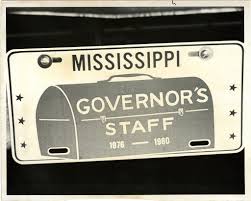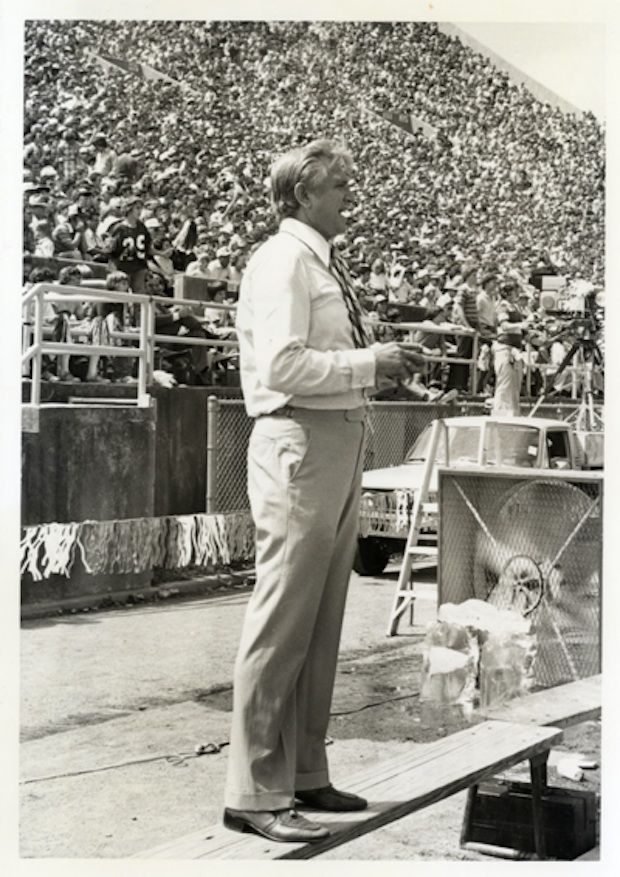Uncategorized
A Portrait of Mississippi Gov. Cliff Finch
Cliff Finch, 57th governor of Mississippi, and my father, will be remembered as one of the most colorful and populist governors in the state’s history.
Riding into the governor’s mansion on a bulldozer, Gov. Finch developed a coalition of blue-collar white and African-American Democrats. His slogan was, “The working man’s friend,” and he ran a campaign while carrying a lunchbox and spending one day each week laboring alongside blue-collar workers, operating a bulldozer, digging ditches and pumping gas.
In order to relate with the former governor, it’s important to know his background.
Charles Clifton “Cliff” Finch came from humble beginnings, working on the family farm, going to school, then selling produce off the back of his father’s truck. He was born on April 4, 1927, in the tiny country community of Lovejoy, Miss., nestled between Pope and Water Valley, Miss. Lovejoy is a close-knit farming community, where everyone knows everyone, and most of the people are related.
Born in the Great Depression, he grew up a hard-working boy but, as any boy does, he took time to get into mischief.
Ely Corruthers, farmer and childhood friend of Finch, said, “We would get finished with all our chores and slip off to the lake and go swimming. Most of the time we would get a whipping because when we came back home, we were covered head to toe in mud. All of us were dirt poor, so we had to rely on our wits, hard work, and the kindness of others to get by.” Corruthers said he and the future governor lived on neighboring farms. Since they were the same age, they became best friends.
Corruthers, now a graying black gentleman and losing some of his teeth, had to quit school, as a boy, to work and help his family survive. “We were up at four in the morning, milking cows, drawing water from the well, building fires for cooking, and all of this for the break of dawn. We both came from big families and had to pull our weight.”
Corruthers said that most families in the country didn’t have running water back then, so feeding and watering the livestock was the first chore of the day. And when Cliff got out of school, he would come home and go to work in the fields. He said that most of the time, they wouldn’t get back for supper till after dark.
Corruthers said he feels that’s where Cliff got his hard working nature. “Carl, Cliff’s father, was a strict man and made Cliff ‘toe-the-line.’ He (Carl) made sure that Cliff was in church every Sunday,” he added. The church Cliff’s family attended was Lovejoy Methodist Church, a quaint rural church, not far from the Finch Farm.
He said that as Cliff got older, he took up an interest in sports. “Cliff loved to play basketball,” he said. “If Cliff wasn’t doing his chores or playing basketball, his head was always in a book. He just loved to read. He was always learning something.”
Corruthers felt that when Cliff got old enough, he enlisted in the army. After boot camp, Cliff was shipped off to Europe to fight in World War II. He served in the Italian campaign of the 88th Infantry; and after the war, he worked in construction and heavy machinery (drag lines and bulldozers) on the island of Guam.
Dennis McMinn, Cliff’s second cousin, said that when Cliff got back from Guam, he started driving gravel trucks and hauling pulpwood. “He worked all the time, and before long, Cliff bought himself a beautiful blue convertible. It was the only one around. And believe you me, the girls took notice. Whenever Cliff was off, he would come and pick me up and we would go ‘catting around’ to meet the girls.”
After a few years, McMinn said that he started seeing less and less of Cliff. “After a while, we figured that Cliff had met someone.” McMinn was right. Cliff had met his future wife, Zelma Lois Smith.
The daughter of John and Jessie Mae Smith, Zelma was originally from Forest, Miss., and moved to Pope, Miss. because her father worked for the Corps of Engineers and they were relocated to help build Sardis Dam. Zelma soon graduated from Mississippi State with a education degree and had returned home to teach in the Batesville School District.
Pat Logue, Zelma’s sister, said that Cliff and Zelma’s chemistry was obvious from the beginning. “Zelma was very ambitious, so when they started talking about marriage, Zelma told Cliff that she wasn’t going to marry a poor man, so Cliff needed to get his degree.” Logue said that Cliff left for school at Ole Miss, and they were soon married. “I don’t think Cliff would’ve ever gone to college if he hadn’t met Zelma. She pushed him. Cliff was the smartest man I’ve ever met. Whenever we would get together, I would get nervous. I just didn’t want to say anything wrong. And I think that’s one of the great points Zelma fell in love with.” Logue said.
Finch worked three jobs and served on the campus Senate. With the support of his wife, he received his undergraduate degree in public administration. When he and Zelma discussed their next move, Cliff decided that he had a keen interest in law. In 1958, Finch graduated with a juris doctorate (in law) from Ole Miss. He was a family man, with two small daughters, Janet and Anne.
The new attorney entered legal practice, working for Ross Barnett, who would soon be governor in 1960. Their first son, Charles, was on the way, and Finch was elected to the House of Representatives. I was born in 1963. Cliff and Zelma had four young children. Midway through 1964, Zelma was involved in a tragic horse accident. Zelma suffered severe head trauma, so Cliff decided to be closer to home,” Logue said.
 In 1964, Finch was elected district attorney of the 17th Judicial District, serving Batesville and surrounding areas. He served as DA from 1964 to 1972.
In 1964, Finch was elected district attorney of the 17th Judicial District, serving Batesville and surrounding areas. He served as DA from 1964 to 1972.“Cliff was the quintessential workaholic. He was in his office at daybreak and often stayed till after midnight,” said Mike Amis, a close personal friend, and later on, co-campaign manager for’75 gubernatorial campaign. “He was the hardest working man I’d literally ever seen. While he was a very hard worker, he would always try to make time to spend with his family.” He loved to hunt and work on the farm, and teaching me how to swim and playing tennis.
He always made sure that we were dressed and ready for church on Sunday morning and after service, he would take us out to eat. That was a ritual with us unless it was a holiday. On holidays, we would all gather at grandma Smith’s house for “family get-togethers.”
He tried to instill a good work ethic with all of his children, making sure that we learned the value of a dollar. During the summers, my brother and I worked on the farm and my sisters worked for Dad in the law office.
Finch made his first attempt at statewide politics in 1972, when he campaigned for lieutenant governor. By that time, I was nine and rode all around Mississippi campaigning with Dad.
He was a very busy man, trying to run a law practice, provide for his family, and campaigning for office, which consequently, meant that he was late for engagements most of the time.
On one occasion, we were late for a campaign rally, and having a heavy foot, he drove 90 to 100 miles an hour to try and make it there on time. When we arrived, there was a group of highway patrolmen there. One of the troopers was David Huggins, the future chief of security during Cliff’s gubernatorial administration. Being young and candid, I told the highway patrolmen about how fast we drove to get there. They turned around and looked at dad, and he just blushed. That story still haunts me to this day. Huggins and I are still great friends, and he reminds me of the story every chance he gets.
It was at that time that I realized how well dad could relate with anybody. He had the charm, charisma and a big smile that made anyone feel as though they were his best friend.
Unfortunately, Cliff was defeated by William Winter for lieutenant governor. So, he returned to Batesville, Miss., resumed building his law practice and to be with his family and friends. During the next few years, life for the family was more relaxed, but not for Dad. Some weeks, we wouldn’t see Dad all week, except for Sunday. He was a deacon and Sunday school teacher for the First Baptist Church of Batesville. He was very strict about going to church. He wanted to ensure that his children were instilled with sound values and morals. To be honest, sometimes we rebelled. After a long explanation and some stern attitude adjustment, we would come around to his way of thinking.
It was clear that he loved us and wanted us to do our best. I don’t think I ever saw Dad lose his
temper, but I did see him get mad more than once. When one of us stepped out of line, he would send us to our room and have us wait while he cooled down. After that, he would call us into his room and talk with us. He would reason with us and point out where we had gone wrong, then proceed with the discipline. Dad came from a strict background and often repeated, “Spare the rod, spoil the child.” To be fair, he was a very happy man and we tried not to test his patience. But he would let us know when he disapproved of our behavior.
Late in 1974, Dad sat us down and asked us if we minded helping him run for governor? I liked the campaign trail so I didn’t object, but the other ones took some persuading. Convinced by his charm and persuasion, the rest of the family got “on board” for another run.
Mike Amis, co-campaign manager said, “Cliff had a game plan. He had come up with the idea of representing rural Mississippians with the slogan, ‘The working man’s friend.’ When it came time for him to ‘toss his hat in the ring,’ Cliff brought his lunch box to the courthouse, and it was filled with the party fee, 300 one-dollar-bills. He wanted to show he was one of ‘common folk.’ Cliff was a brilliant tactician. ‘The Working Man’ made him a household name. If you didn’t like his politics, and you had a chance to meet him, he would win you over with his charm and charisma. You couldn’t help but just like the guy.”
Amis said that Cliff was was a person that could relate with anyone, from the elite to the common man. But Cliff felt most at home around the working class people. “I think it came from his background. He was dirt poor growing up, worked so hard to get things accomplished, and he did. He just loved Mississippi and everything about it,” Amos added.
Amis felt recording media spots were important, but Cliff felt most comfortable in getting out with the people, shaking hands and kissing babies. “That’s where he shined, making personal contact. And if you met him one time, and didn’t see him again for years. He would still remember you by name. It amazed me,” Amis said.
Reporters wrote about the many clichés that Dad used in his speeches, but that’s how he normally spoke. From the time that I first able to remember, Dad was saying, “Early to bed, early to rise, makes a man healthy wealthy and wise,’ a bird in the hand is better than two in the bush,” and scores of others. I always thought it was his way of reinforcing his point, but after careful study, I think it was his method of trying to relate to his audience.
What I found odd about the “early to bed” cliché was that he never was in bed early, but was the first one up. Huggins, chief of security, said, “it was the darndest thing. He would go to bed at two or three in the morning and be up at six ready to go. We would have to rotate security detail just to keep up with him.”
Huggins felt that “the governor”was an eternal optimist. I never saw him sad or down. Whenever he got some bad news, he would take a deep breath, shake it off, smile and start working on the solution,” Huggins added. “It was uncanny. The polls kept telling us that the governor wasn’t going to win, but he just kept plugging away. On election night, the first ballot counts came in from the cities and were predicting Gil Carmichael to win, but as the rural ballots came in, Cliff’s count started to rise. And that was his base. The common everyday person,” Huggins said. “Cliff proved all the naysayers wrong.”
The family moved into the mansion, and as usual, Dad didn’t slow down a bit. But, the family did see a lot more of him. Dad got us dirt bikes and would take us riding every chance he got. At least once a year he made time to take each one of the children on a vacation. He felt it was important to have “one on one” time with each of us.
Once dad was in office, he had a staff of people who helped him stay organized and on schedule. Ed Meek, assistant vice chancellor for public relations and marketing, said, “The funny thing was, most of the serious business decisions were handled in the kitchen over a biscuit every morning. Once we got to the office, most of the work had been done.”
After the term was over, the family moved back to Batesville and Dad started practicing law again, which is where he seemed to be happiest. He loved helping people and most of those he helped seemed to have the odds stacked against them. They had very little money and were up against big insurance companies that had stables of lawyers.
“One of the great things about Cliff was, if he believed in your cause, all you had to do was give him one dollar as a retainer fee. He believed in upholding the rights of the less fortunate,” Pat Logue said. “He was just that good.”
On April 22, 1986, Gov. Cliff Finch passed away from heart attack. He was 59 years old. It was speculated that he was getting ready to run for governor again. The consensus was, he probably would’ve won. He was a colorful and passionate man with a big belly laugh and a smile that would brighten your day. It’s truly an honor to be able to call him Dad.
 Written by Nick Finch, son of Gov. Cliff Finch.
Written by Nick Finch, son of Gov. Cliff Finch.References: The Mississippi Archives and History
































Micah Evans
January 30, 2020 at 1:05 pm
Nick, if you read this, Did you go to a little private school called Bearss Academy years ago?